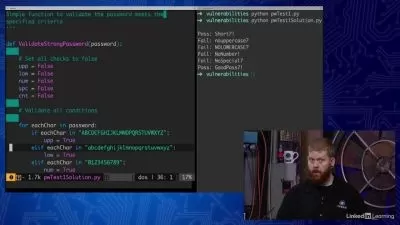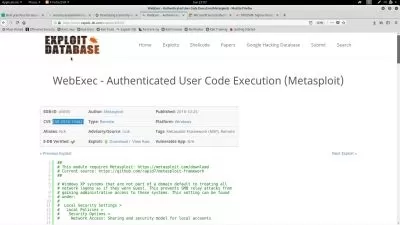Cyber Security for Non-Technical User
Vijay Kumar
3:46:47
Description
Unlocking Cybersecurity: Empowering Non-Technical Users with Digital Protection Skills
What You'll Learn?
- Students will gain a fundamental understanding of cybersecurity concepts, terminology, and the importance of protecting their digital information.
- They will learn about common cyber threats, including malware, phishing attacks, social engineering, identity theft, and online scams.
- Students will understand the importance of strong passwords and learn best practices for creating and managing secure passwords. Two factor Authentication
- hey will learn safe browsing habits, such as identifying secure websites, avoiding suspicious links, and using reputable sources for online activities.
- Students will learn how to identify and handle suspicious emails, avoid email scams, and protect their personal information on social media platforms.
- Students will learn about best practices for securing their mobile devices, such as enabling device encryption, installing updates, and using app permissions wi
Who is this for?
What You Need to Know?
More details
DescriptionThe "Cybersecurity for Non-Technical Users" course is designed to provide individuals with essential knowledge and practical skills to navigate the digital landscape securely. This course is specifically tailored for non-technical users who want to protect themselves and their digital assets from various online threats.
In this course, students will gain a solid understanding of cybersecurity concepts and terminology without requiring any prior technical knowledge. They will learn about common cyber threats, including malware, phishing attacks, social engineering, identity theft, and online scams. Through real-world examples and case studies, students will develop the ability to identify and avoid potential risks.
The course will cover best practices for password security, safe internet browsing, and email and social media security. Students will learn how to create and manage strong passwords, recognize secure websites, and handle suspicious emails and social media interactions. They will also explore privacy settings and effective strategies to protect their personal information online.
Additionally, the course will address mobile device security and the risks associated with public Wi-Fi networks. Students will understand the importance of regular data backups and learn various methods for backing up their important files. They will also explore techniques for data recovery in case of a loss or ransomware attack.
Throughout the course, emphasis will be placed on developing cybersecurity awareness and a skeptical approach towards potential threats. Students will learn to spot red flags, report cybersecurity incidents appropriately, and respond to different types of cyber incidents.
By the end of the course, students will have the necessary knowledge and skills to protect themselves and their digital assets in today's digital world. They will be equipped with practical strategies, tools, and resources to navigate the online landscape securely and confidently, regardless of their technical background.
Note: This course is not intended to provide comprehensive technical training in cybersecurity. Instead, it focuses on empowering non-technical users with the knowledge and skills required for personal cybersecurity.
Who this course is for:
- The course on cybersecurity for non-technical users is designed for individuals who do not have a strong technical background but want to learn how to protect themselves and their digital assets from online threats. The course is suitable for a wide range of individuals, including:
- General Users, Students, Small Business Owners, Parents and Guardians, Senior Citizens, Non-Technical Professionals, Job Seekers, everyone can take this course
The "Cybersecurity for Non-Technical Users" course is designed to provide individuals with essential knowledge and practical skills to navigate the digital landscape securely. This course is specifically tailored for non-technical users who want to protect themselves and their digital assets from various online threats.
In this course, students will gain a solid understanding of cybersecurity concepts and terminology without requiring any prior technical knowledge. They will learn about common cyber threats, including malware, phishing attacks, social engineering, identity theft, and online scams. Through real-world examples and case studies, students will develop the ability to identify and avoid potential risks.
The course will cover best practices for password security, safe internet browsing, and email and social media security. Students will learn how to create and manage strong passwords, recognize secure websites, and handle suspicious emails and social media interactions. They will also explore privacy settings and effective strategies to protect their personal information online.
Additionally, the course will address mobile device security and the risks associated with public Wi-Fi networks. Students will understand the importance of regular data backups and learn various methods for backing up their important files. They will also explore techniques for data recovery in case of a loss or ransomware attack.
Throughout the course, emphasis will be placed on developing cybersecurity awareness and a skeptical approach towards potential threats. Students will learn to spot red flags, report cybersecurity incidents appropriately, and respond to different types of cyber incidents.
By the end of the course, students will have the necessary knowledge and skills to protect themselves and their digital assets in today's digital world. They will be equipped with practical strategies, tools, and resources to navigate the online landscape securely and confidently, regardless of their technical background.
Note: This course is not intended to provide comprehensive technical training in cybersecurity. Instead, it focuses on empowering non-technical users with the knowledge and skills required for personal cybersecurity.
Who this course is for:
- The course on cybersecurity for non-technical users is designed for individuals who do not have a strong technical background but want to learn how to protect themselves and their digital assets from online threats. The course is suitable for a wide range of individuals, including:
- General Users, Students, Small Business Owners, Parents and Guardians, Senior Citizens, Non-Technical Professionals, Job Seekers, everyone can take this course
User Reviews
Rating
Vijay Kumar
Instructor's Courses
Udemy
View courses Udemy- language english
- Training sessions 42
- duration 3:46:47
- Release Date 2023/09/10









